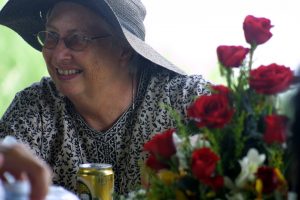The Khmer Rouge tribunal is expected to hold its last public hearings starting from August 16, when the former head of state, Khieu Samphan – the last of Pol Pot’s living henchmen – is slated to appear and deliver an oral defense of the crimes committed between 1975 and 1979.
A bench of Cambodian and international judges will then deliberate on the 90-year-old’s appeal against his convictions for genocide and crimes against humanity.
Nine days have been reserved for the hearings, following which the Extraordinary Chambers in the Courts of Cambodia (ECCC) will start finalizing more than 15 years of legal work.
The Diplomat’s Luke Hunt spoke with Helen Jarvis at her home on the banks of the Mekong River, north of Phnom Penh, about the “Herculean” efforts required to establish the tribunal, its successes, and other issues.
Jarvis served as chief of the Public Affairs Section from the ECCC’s inception until June 2009 and then as head of the Victims Support Section until her retirement a year later.
She has since worked as a genocide scholar and says the U.N.-backed court has achieved its aim of putting senior Khmer Rouge leaders on trial for the deaths of up to 2.3 million people and in putting their crimes on the international record to be recognized by future generations.
The ECCC has also secured convictions against the former commandant of the S21 torture and extermination center Kaing Guek Eav – commonly known as Duch – and former “brother number two” Nuon Chea. Both died behind bars.
Others, including Pol Pot’s former foreign minister Ieng Sary, Sary’s wife Ieng Thirith, and the former military chief Ta Mok, died before justice could be rendered.
Outstanding cases are also expected to be dealt with, including former commanders Meas Muth and Yim Tith, which remain in a legal limbo with Cambodian and international prosecutors divided over whether to proceed.
Jarvis was recently the recipient of the 2021 Lifetime Achievement Award from the International Association of Genocide Scholars, for her “deep commitment and myriad intellectual and political accomplishments, including a principal role in the formation of the ECCC.”
She also co-authored the book “Getting Away with Genocide,” written with journalist Tom Fawthrop.
Luke Hunt can be followed on Patreon and on Twitter @lukeanthonyhunt

































